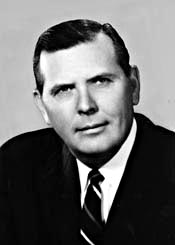Joel Broyhill
| Joel Broyhill | |
|---|---|
 |
|
| Member of the U.S. House of Representatives from Virginia's 10th district |
|
|
In office January 3, 1953 – December 31, 1974 |
|
| Preceded by | District established |
| Succeeded by | Joseph L. Fisher |
| Personal details | |
| Born |
Joel Thomas Broyhill November 4, 1919 Hopewell, Virginia |
| Died | September 24, 2006 (aged 86) Arlington, Virginia |
| Political party | Republican |
Joel Thomas Broyhill (November 4, 1919 – September 24, 2006) was an American politician and a Congressman from Virginia for 11 terms, from 1953 to 1974. He represented Virginia's 10th congressional district, consisting of suburbs of Arlington, Falls Church and sections of Fairfax County and Alexandria, and was known for his opposition to integration in the 1950s and 1960s.
At the age of eighteen, Broyhill moved to Arlington when his father relocated his building and real estate firm, M.T. Broyhill & Sons Corporation , in the area. He then attended George Washington University from 1939-1941. He enlisted in the United States Army in February 1942. He served in European Theater as a captain in the 106th Infantry Division. He narrowly escaped death when Allied planes bombed the Nazis, and the explosions harmed his hearing for life. Captured by the Germans during the Battle of the Bulge, he escaped six months later from a prisoner-of-war camp and rejoined advancing U.S. forces. He was released from active duty November 1, 1945. Among his military awards was a Bronze Star Medal.
After the war, he rejoined his family's real estate firm, where he became partner and general manager.
He was president of the Arlington County Chamber of Commerce and chairman of the Arlington County Planning Commission. In 1950 he was elected president of the Arlington Republican Club.
In 1952 he ran for Congress, and won on his 33rd birthday. Broyhill defeated Democrat Edmund D. Campbell by 322 votes, riding the coattails of the Dwight D. Eisenhower and Republican Party landslide that year. He won his next ten elections but lost during the Democratic landslide in 1974 in the wake of the Watergate scandal and the resignation of President Richard Nixon. He was the first representative to Virginia's new 10th district, which had been carved out of the old 8th district, then represented by Howard W. "Judge" Smith, a legendary and powerful Democrat who controlled legislation through his chairmanship of the House Rules Committee. The Washington Post wrote
...
Wikipedia
